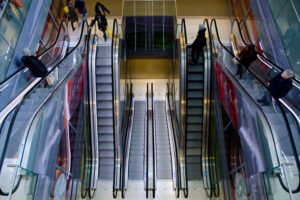It is not a secret to hear that the restaurant industry has suffered severely within the retail sector. With additional restrictions imposed by various governments across Europe, in the past few weeks, the situation is only going to worsen, before getting better. Putting it simplistically, the pandemic has resulted in rising costs–as a result of the hygiene and safety requirements, staff training, ongoing wages–without an increase in sales given the reduction in customers allowed in the restaurant due to social distancing. The direct correlation is that there has been, or will be, a reduction in the F&B areas dedicated to this sector of retail in malls and retail destinations. However, it still requires thought about the right merchandise mix, and this could be an opportunity to rethink the center itself.
A recent global study by Accenture released in August indicated that 38% of people interviewed would be “uncomfortable” about returning to cafés and restaurants in the next six months. As this study was released before the so-called second wave, one can assume that this number will increase. This leaves us with the conclusion that if restaurants are to survive, they must seek alternatives to their current business model. A few examples of this can be found in the food halls, dark or ghost kitchens and outdoor eating areas. Each in their own way attempts to offer a lifeline to the tenants. They are important because they offer opportunities to optimize the cost base (in the food hall and dark kitchen models), and create additional space using outdoor areas to cater for social distancing and have more guests. Outdoor seating has certainly taken off, but its continued success will depend on local authorities being lenient and accepting this as a way to help fragile owners and operators for as long as possible. In some cases, opening and closing hours have had to be adjusted to help meet the needs of the local community.
In the case of dark kitchens, the premise is using technology via platforms such as Deliveroo, Uber Eats and others, to place orders to kitchens operated by these restaurants, thereby reducing real estate, labor and general operating costs. Ordering through these digital channels is a welcome boost for the restaurants as it not only helps deliver additional sales, but also keep their customers serviced during the pandemic. Having said all that, the pandemic should provide an opportunity for the small, independent restaurants or concepts to be born and find a place in the retail landscape going forward, contingent upon the landlords offering them deals that they can afford. We remember the impact food trucks have had. Those ideas can be developed further.
The leisure sector, however, will take longer to come back. We are witnessing large cinema groups in danger of collapse, not only due to the pandemic, but due also to the delays in the blockbuster movies scheduled to have come out in the autumn. Dwindling numbers in cinemas, despite social distancing regulations being followed has put additional strain on the sector. One way to address this would be the use of innovation and digital technology combining hybrid permanent and digital solutions, such as augmented reality, live streaming, e-sports and so on, which create an experience that is both digital and social, drive footfall and revenue.






